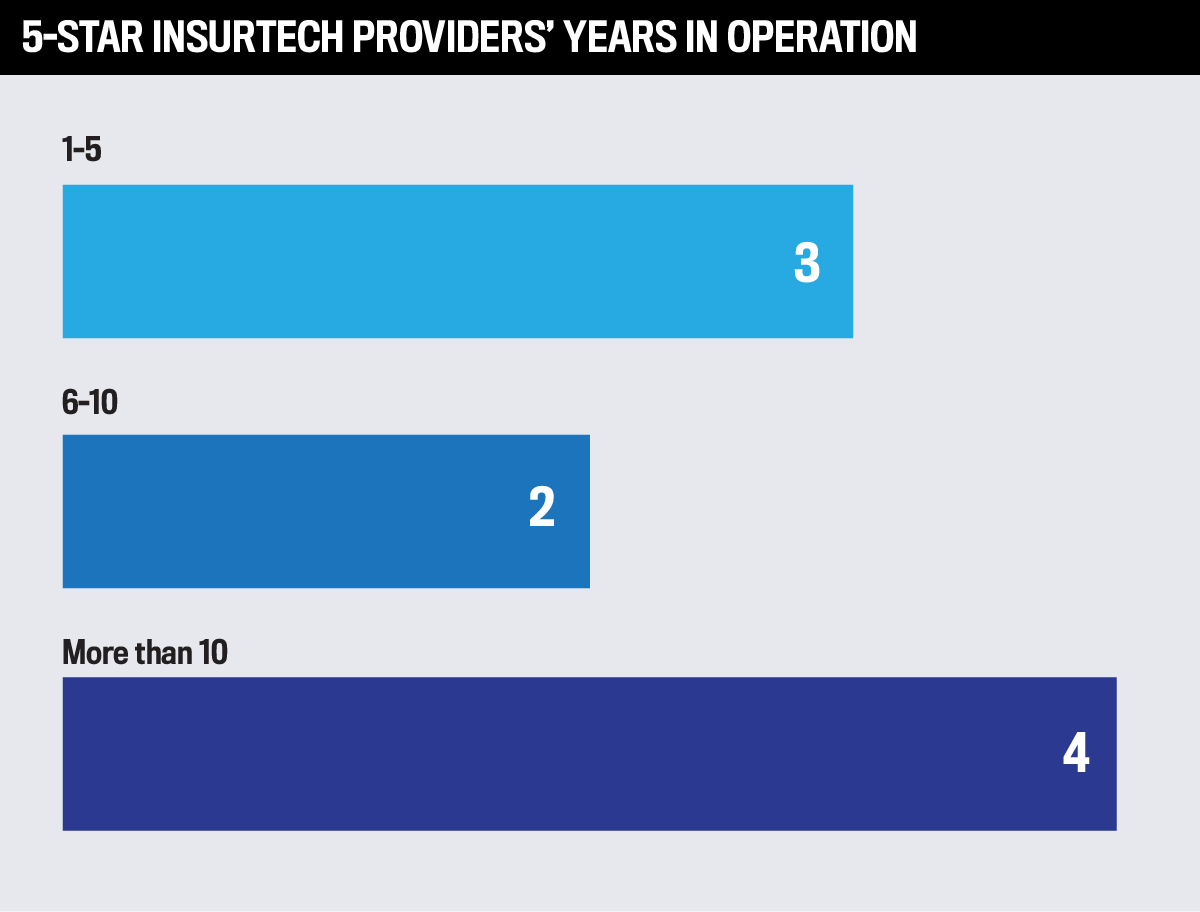5-Star Insurance Technology Providers 2022

Jump to winners | Jump to methodology
Empowering insurance
The numbers don’t lie.
“Insurtechs are driving digital innovation and disruption in the industry, with investments in insurtechs worldwide growing from $1 billion in 2004 to $7.2 billion in 2019 to $14.6 billion in 2021,” according to McKinsey.
“More than 40% of insurtechs are focused on the marketing and distribution segments of the insurance value chain, enabling them to solve customer pain points through a digitally enhanced client experience that could pose a competitive threat to incumbents.”
The Insurtech Global Market Report 2022 is equally optimistic. It expects a compound annual growth rate of 29.2% as the market’s value rises from $8.07 billion in 2021 to $10.42 billion this year.
“We’re a non-profit organization dedicated to upholding the voices in our industry that are typically excluded or minimized. We bring more voices to the space, especially those that are typically underrepresented”
Elisa Stampf, Insure Equality
Ty R. Sagalow, CEO and founder of Innovation Insurance Group predicts that “in 10 years, insurtech will simply be called insurance. Eventually, it’ll take over the insurance industry”.
America is a particular hotspot due to a combination of the country’s tech industry and legal framework. As InsurTech Consulting’s president Alan Demers explains, “I’m in Columbus for example – there’s a strong Insurtech movement here. Places like Miami, Denver, Boston and Austin and [others] have also planted seeds, and we’re starting to see the benefits from that.”
The 2022 Insurance Technology Providers are thriving in this booming industry, and Insurance Business celebrates their leading-edge technologies that help transform partner and client experiences. From digital platforms underpinning traditional industry services to mavericks delivering new solutions to the marketplace, they stand out from the competition and are backed by brokers using them on a day-to-day basis.
Amplifying excluded voices
One winner is Insure Equality, a platform resembling Glassdoor but for the insurance industry and specializing in diversity, equity and inclusion (DE&I), which often is underfunded and overlooked. In a 2022 survey of HR and DE&I practitioners conducted by Culture Amp, 81% of respondents had faith in their DE&I initiatives. However, only 34% said they had enough resources to support those initiatives. A global study conducted by United Minds last year reported that 78% of senior DE&I leaders agreed that their work wasn’t prioritized unless there was a visible or public problem.
Insure Equality’s technology enables employees to share their stories and employers to track progress toward improving their cultures, while taking strides to achieve DE&I objectives.
“We’re a non-profit organization dedicated to upholding the voices in our industry that are typically excluded or minimized,” says Elisa Stampf, CEO and cofounder of Insure Equality. “We bring more voices to the space, especially those that are typically underrepresented.”
For example, one of the most misrepresented groups is women of color, who face a “broken rung” challenge, according to McKinsey’s Women in the Workplace study.
“For every 100 men promoted to manager, only 86 women are promoted,” the report says. “As a result, men outnumber women significantly at the manager level, which means that there are far fewer women to promote to higher levels.”
In June, Insure Equality launched an employee survey platform called Phoenix, which has seen a 40% month-to-month growth rate with limited marketing. Seventy-five percent of the company’s clients are Gen Z and millennials. On the flip side, employers can track their progress and see where they need to double down or increase their efforts.
Employees rate their companies, but there’s more to Phoenix than that. “We’re not focused on a star rating, percentage rating,” says Stampf. “This has far more to do with how the culture ‘feels’ and whether or not you liked where you worked.”
To help counter the fear of retribution for bad reviews, Insure Equality provides safe haven functionality, where a user can choose not to let their employer see the information provided. In addition to enhanced profiles, the company is working on delivering a paired certification program that helps businesses take a deep dive into their existing policies and sets them on the right path.
What else makes Insure Equality unique? Its workers are mostly a volunteer team. “Almost all of our funding that comes through donations [goes] straight to our programmatic activity, so people [are assured] that the donation goes to where it matters,” she adds.
“We built our own platform that connects to all the different flood carriers and provides viable indications and quotes in real time to agents depending on what the carriers are willing to do”
Martin Burlingame, One80 Intermediaries

An ark for flood victims
Another winner is Noah Flood, a flood insurance platform from One80 Intermediaries, a wholesale brokerage and program manager.
Floods are some of the most frequent natural disasters in the US. Since 2000, they have cost American taxpayers $850 billion, two-thirds of the total cost of all natural disasters, yet only 1 out of 10 homes are insured for flood and that number could be reduced soon. According to a FEMA report obtained by the Associated Press, one million fewer Americans will buy flood insurance by the end of the decade due to cost increases.
Noah Flood offers a variety of different carrier quotes and comparative rates to renew against a current policy. According to Martine Burlingame, the national director of contract binding at One80 Intermediaries, there were many comparable platforms on the market but none that had access or the ability to put policies in place.
“So, we built our own platform that connects to all the different flood carriers and provides viable indications and quotes in real time to agents depending on what the carriers are willing to do,” he says. “We’ve got five carriers now – we’ll be at nine, hopefully, by the end of the year.” They’re also trying to integrate the platform with the National Flood Insurance Program systems.
For Burlingame, a major problem with the insurtech market has been entrepreneurs who build disruptive products but leave out the intermediaries, thus hindering profitability. One example is a simple business-to-consumer model that cuts out agency distribution.
“We focus directly on access for the agent to the carriers, and it’s a bindable quote that pops up on their screen in real time,” he says. “It provides a line of business that doesn’t really have multi-carrier bindable options out there. There’s some software that can allow you to put in and get quotes, but you may not have those carriers. It’s a profitable product for us within the system.”
Regarding burdensome government regulations, Burlingame says One80 deals with a lot of tax-related issues. “We have 51 domiciled locations, if you add DC, all with different forms, different bureaus, different taxes,” he explains. “Some states don’t require a surplus lines due diligence for flood while other states do. They keep constantly updating their forms. Some have to be signed by the individual. Some have to be notarized.
“It’s chaos. It just needs to be cleaned up by the states, and they’re never going to get there. So, not only is it a headwind, it’s like a gale force.”
“We probably accomplished 10 years’ worth of transformation work in the last couple of years”
Rich Belanger, Applied Systems
Epic underlying technology
Another 5-Star winner is Applied Systems, which won for its Applied Epic and Applied TAM products. The former is a cloud-based system that enables agencies to manage everything from roles and locations to lines of business, including P&C and benefits. TAM stands for The Agency Manager and provides an overview of clients and day-to-day operations; it also allows for automation of workflows between insurers and their partners.
Rich Belanger, the CTO of Applied Systems, explains, “We have a whole suite of products ranging from support automation and marketing automation to mobile access, and our products are designed to allow an agency to run all aspects of their business from prospecting – working with producers – and getting new customers all the way back through financial management and accounting, claims and policy management – really everything you need to run an agency.”
Regarding recent market conditions, Belanger says Applied Systems sees a lot of activity in the inter-tech space, as well as opportunities to bundle recent acquisitions together to create larger ecosystems. The pandemic, he says, has had a positive impact on the insurtech space.
“We probably accomplished 10 years’ worth of transformation work in the last couple of years,” he adds. “And, by necessity, we see a greater willingness to fix some of the older, more broken manual processes, which enables a lot of innovation both for startups, and there’s a lot of capital sloshing around.”
Belanger says Applied Systems distinguishes itself from the competition by offering 24 x 7 live person support, and by offering what he says is “simple, delightful and elegant” customer experience.
“That’s just not something that’s been a big priority for a lot of ERP systems,” he says. “But why shouldn’t it? You pay a lot of money for people like us, why shouldn’t it be an amazing and delightful experience?”
Meanwhile, Belanger agrees with Burlingame that taxes have been a major headwind, especially with property insurance, which has significant differences from state to state.
“As a fairly large market participant, it probably gives us an unfair advantage, right?” he says. “Because we have the capacity to keep track of all this stuff that a startup just doesn’t. So, if I put my capitalist hat on, I think all the regulation winds up tilting the marketplace in favor of the larger providers.”
Applied Systems (Applied Epic and Applied TAM)
Cover Genius (XCover)
Fat Agent (Fat Agent)
InsCipher (InsCipher Connect)
Insure Equality (Phoenix)
Nayya (Choose)
One80 Intermediaries (Noah Flood)
Zywave (Zywave)
‘Market-leading’ is a phrase many technology companies like to use when describing their software. Now, nine companies can claim that title on the back of hard market research from the people who matter most: insurance brokers.
To select the 5-Star Insurance Technology Providers for 2022, Insurance Business America issued a call for nominations. Technology providers were asked to nominate their products, explaining what makes them the best in the market and why they stand out against competitors. The IB America team then reached out to brokers, asking them to vote for the insurtech providers they had dealt with. The top-scoring technology and software providers were named 5-Star Award winners.





